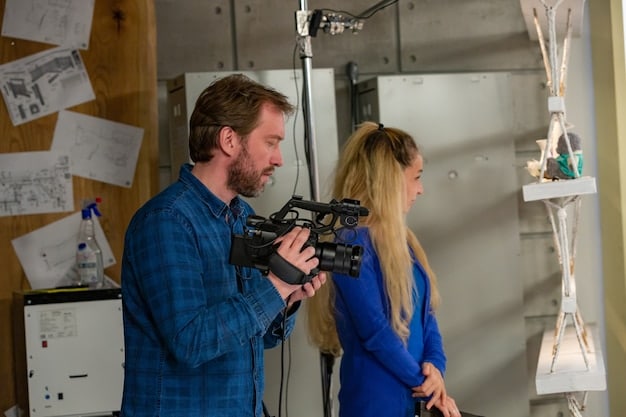Short Film Networking: Building US Film Industry Connections

Short film networking is crucial for emerging filmmakers in the US film industry, facilitating connections and collaborations that can significantly impact their careers by providing opportunities for funding, distribution, and mentorship.
Navigating the US film industry as a short filmmaker can be challenging, but mastering short film networking is your crucial first step. Discover how to build connections and foster collaborations to propel your career.
Understanding the Importance of Short Film Networking
Short film networking plays a vital role in the US film industry, especially for emerging filmmakers. It’s not just about making friends; it’s about building a professional ecosystem that supports your career growth.
In this section, we’ll explore why networking is essential for short filmmakers and how it can open doors to various opportunities.
Why Networking Matters for Short Filmmakers
Networking provides access to resources, collaborations, and mentorship that are often unattainable through traditional channels. Let’s discuss the key benefits.
- Access to Funding: Many short film projects are funded through grants, private investors, and crowdfunding. Networking can connect you with potential funders who are passionate about supporting emerging talent.
- Collaboration Opportunities: Filmmaking is a collaborative art. Networking helps you find talented crew members, actors, and other creatives who can bring your vision to life.
- Distribution and Exposure: Getting your short film seen by a wider audience requires strategic distribution. Networking can lead to screenings at film festivals, online platforms, and other venues.
- Mentorship and Guidance: Experienced filmmakers can offer invaluable advice and guidance. Networking allows you to connect with mentors who can help you navigate the complexities of the industry.
Effective networking can dramatically increase your chances of success in the competitive film industry. It’s about building genuine relationships based on mutual respect and shared passion.

In conclusion, short film networking is not just a supplementary activity; it’s a core component of advancing your career as a filmmaker. It opens doors to funding, collaboration, distribution, and mentorship, providing you with the resources and support needed to succeed.
Key Networking Events in the US Film Industry
Attending the right networking events can significantly boost your chances of making valuable connections. The US film industry offers numerous opportunities for short filmmakers to connect with peers and industry professionals.
Let’s explore some of the key events where you can network effectively.
Film Festivals: The Heart of Short Film Networking
Film festivals are prime opportunities to showcase your work and meet fellow filmmakers, distributors, and industry executives. Consider these notable festivals:
- Sundance Film Festival: A prestigious festival known for discovering new talent.
- Tribeca Film Festival: Celebrates independent film and offers extensive networking opportunities.
- South by Southwest (SXSW): A dynamic festival that combines film, music, and interactive media.
- LA Film Festival: Showcase for independent and international cinema.
Industry Conferences and Workshops
Industry conferences and workshops provide structured environments for learning and networking. Events to consider include:
- American Film Market (AFM): A major film industry event for buying, selling, and distributing films.
- National Association of Broadcasters (NAB) Show: Focuses on broadcasting, media, and entertainment technology.
- Independent Filmmaker Project (IFP) Week: A project market and conference for independent filmmakers.
These events provide opportunities to learn from industry experts, pitch your project, and connect with potential collaborators and investors. They also keep you informed about the latest trends and technologies in filmmaking.
Attending these events requires preparation. Research the attendees, prepare your elevator pitch, and set clear goals for what you want to achieve. Remember to follow up with the contacts you make to nurture those relationships.
Effective Strategies for Networking at Film Events
Networking isn’t just about showing up at events; it’s about engaging strategically and building lasting relationships. To make the most of your networking opportunities, consider these strategies.
This section highlights effective tactics to enhance your networking success at film events.
Crafting Your Elevator Pitch
Your elevator pitch is a concise summary of who you are and what you do. It should capture attention and spark interest.
Here’s how to create an effective elevator pitch:
- Keep it short: Aim for 30-60 seconds.
- Highlight your unique selling point: What makes you stand out?
- Focus on your current project: Briefly describe your latest short film and its goals.
- End with a question: Encourage further conversation.
Making Meaningful Connections
Building genuine relationships is more important than collecting business cards. Here’s how to forge meaningful connections:
- Be genuinely interested: Listen actively and show empathy.
- Find common ground: Discuss shared interests and experiences.
- Offer value: Share your expertise and resources.
- Follow up: Send a personalized email or message after the event.
Using Social Media to Enhance Networking
Social media platforms like LinkedIn, Twitter, and Instagram can amplify your networking efforts. Here’s how to use them effectively:
- Engage with industry conversations: Share your insights and perspectives.
- Join relevant groups and communities: Participate in discussions and connect with like-minded professionals.
- Share your work: Showcase your short films and highlight your achievements.
Remember, networking is a long-term investment. Nurture your relationships, stay in touch, and be a reliable and supportive member of the filmmaking community.

In conclusion, implementing these strategies can significantly improve your networking outcomes. Crafting a compelling elevator pitch, making meaningful connections, and leveraging social media are all essential for building a robust professional network in the film industry.
Leveraging Online Platforms for Short Film Networking
Beyond physical events, online platforms offer valuable opportunities for networking with filmmakers and industry professionals. These platforms can help you extend your reach and engage with a global audience.
This section explores various online resources and strategies for effective short film networking.
Online Film Communities and Forums
Joining online film communities and forums can provide a supportive environment for sharing your work, receiving feedback, and connecting with fellow filmmakers. Consider these platforms:
- Reddit (r/filmmakers): A large community where filmmakers discuss various aspects of filmmaking.
- Stage 32: A platform for connecting with film, TV, and digital creatives worldwide.
- FilmConvert Community: A community focused on discussing color grading and post-production techniques.
LinkedIn for Professional Networking
LinkedIn is a powerful tool for connecting with industry professionals, showcasing your experience, and discovering new opportunities.
Here’s how to use LinkedIn effectively:
- Optimize your profile: Highlight your filmmaking skills and accomplishments.
- Join relevant groups: Engage in discussions and connect with group members.
- Connect with industry leaders: Follow and interact with influential figures in the film industry.
Creating an Online Portfolio
An online portfolio is a digital showcase of your best work. It allows potential collaborators and employers to easily review your films and assess your skills.
Platforms for creating an online portfolio include:
- Vimeo: A video-sharing platform popular among filmmakers.
- YouTube: A widely used platform for hosting and sharing videos.
- Personal Website: A professional way to showcase your work and brand.
By leveraging these online platforms, you can create a strong online presence, connect with a global network of filmmakers, and increase your visibility in the industry. Networking online complements your offline efforts, creating a holistic approach to building your career.
Overcoming Challenges in Short Film Networking
Networking can be challenging, especially for those who are introverted or new to the industry. However, with the right mindset and strategies, you can overcome these obstacles and build a strong network.
This section addresses common challenges in short film networking and provides practical solutions.
Dealing with Introversion and Social Anxiety
If you’re introverted or struggle with social anxiety, attending networking events can be daunting. Here are some strategies to help you feel more comfortable:
- Prepare in advance: Research the event and plan your talking points.
- Set realistic goals: Focus on making a few meaningful connections rather than trying to meet everyone.
- Bring a friend: Having a supportive companion can ease anxiety.
Building Confidence and Self-Assurance
Confidence is key to effective networking. Here are some tips for building your self-assurance:
- Focus on your strengths: Highlight your unique skills and accomplishments.
- Practice your elevator pitch: Rehearsing your pitch can boost your confidence.
- Celebrate your successes: Acknowledge your achievements and learn from your failures.
Maintaining Long-Term Relationships
Building a network is just the beginning; maintaining those relationships is crucial for long-term success. Here’s how to nurture your connections:
- Stay in touch: Send periodic updates and check in with your contacts.
- Offer support: Help others in your network whenever possible.
- Attend follow-up events: Continue to engage with your network at industry events.
By addressing these challenges head-on, you can overcome obstacles and turn them into opportunities for growth. Remember that networking is a skill that improves with practice. Be patient with yourself, stay persistent, and celebrate your progress along the way.
Measuring the Success of Your Networking Efforts
To ensure that your networking efforts are effective, it’s important to track your progress and measure your success. This section provides guidelines on how to assess the impact of your networking activities.
By quantifying your networking results, you can refine your strategies and focus on the most productive activities.
Tracking Your Contacts and Connections
Maintaining a record of your contacts and connections is essential for staying organized and assessing the growth of your network.
Here are some methods for tracking your contacts:
- Spreadsheet: A simple way to list your contacts and their information.
- CRM Software: Customer Relationship Management tools can help you manage your contacts and track interactions.
- LinkedIn: Use LinkedIn to keep track of your professional connections and interactions.
Assessing the Quality of Your Relationships
The quality of your relationships is more important than the quantity. Assess the depth and potential of your connections by asking yourself:
- Are these relationships mutually beneficial?
- Do these contacts align with my career goals?
- Are these relationships likely to lead to collaborations or opportunities?
Evaluating the Impact on Your Career
Ultimately, the success of your networking efforts should be measured by the impact on your career. Consider these metrics:
- Increased visibility and recognition.
- More collaborations and projects.
- Access to funding and resources.
- Career advancement and growth.
By tracking your contacts, assessing the quality of your relationships, and evaluating the impact on your career, you can gain valuable insights into the effectiveness of your networking efforts. Use this data to refine your strategies and maximize your success in the film industry.
| Key Point | Brief Description |
|---|---|
| 🤝 Attending Film Events | Essential for making connections with industry professionals. |
| 📢 Crafting Elevator Pitch | Summarizing your work and goals concisely for quick introductions. |
| 🌐 Online Platforms | Using LinkedIn, film forums, and personal websites to expand reach. |
| 📈 Measuring Success | Tracking contacts and assessing career impact to refine networking strategies. |
Frequently Asked Questions
▼
Start by attending screenings and Q&A sessions to meet filmmakers in a relaxed setting. Prepare a concise elevator pitch and be genuinely interested in others’ work.
▼
Seek opportunities to connect through workshops or smaller industry events. Prepare thoughtful questions and demonstrate genuine interest in their experiences and advice.
▼
Social media helps maintain professional connections and showcase your work. Engage in industry discussions and join relevant groups to enhance your visibility and network.
▼
Start by setting small, achievable goals like meeting two or three new people. Prepare conversation starters and focus on active listening to ease anxiety.
▼
Send personalized follow-up emails or messages. Reference something specific you discussed to show you were engaged and offer to help them in some way when appropriate.
Conclusion
Mastering short film networking is essential for building connections and fostering collaborations in the US film industry. By attending key events, leveraging online platforms, and employing effective strategies, filmmakers can significantly enhance their career prospects and contribute to a thriving creative community.





